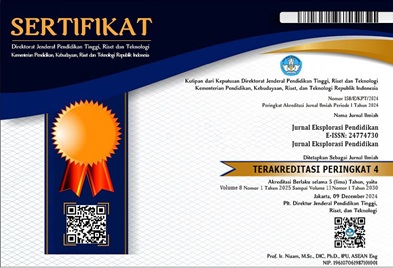EFEKTIVITAS MODEL PEMBELAJARAN INKUIRI TERBIMBING DENGAN MULTI REPRESENTASI TERHADAP KETERAMPILAN PROSES SAINS FISIKA SISWA SMA
Kata Kunci:
Inkuiri Terbimbing, Keterampilan Proses Sains, Multi RepresentasiAbstrak
Penelitian ini bertujuan untuk mengetahui efektivitas model pembelajaran inkuiri terbimbing dengan multi representasi dalam meningkatkan keterampilan proses sains fisika siswa. Jenis penelitian yang digunakan dalam penelitian ini adalah quasi-eksperimeni menggunakan nonequivalent control grup design. Populasi dalam penelitian ini adalah seluruh siswa kelas XI MIPA SMA Negeri 3 Pematang Siantar. Teknik pengambilan sampel menggunakan purposive sampling dimana kelas XI MIPA 4 sebagai kelas kontrol dan kelas XI MIPA 5 sebagai kelas eksperimen. Pada kelas kontrol menggunakan pembelajaran konvensional dan pada kelas eksperimen menggunakan model pembelajaran inkuiri terbimbing dengan multi representasi. Keterampilan proses sains diukur menggunakan tes pilihan berganda. Berdasarkan hasil penelitian menunjukkan bahwa skor rata-rata post-test kelas eksperimen lebih tinggi dengan rata-rata 75,24 (75%) dibandingkan skor rata-rata post-test kelas kontrol sebesar 48,60 (48%). Hal ini menunjukkan bahwa keterampilan proses sains siswa meningkat sebesar 27%. Hasil uji hipotesis penelitian menunjukkan bahwa 13,73 > 1,67 artinya diterima dan ditolak sehingga dapat disimpulkan bahwa model pembelajaran inkuiri terbimbing dengan multi representasi efektif untuk meningkatkan keterampilan proses sains fisika siswa pada materi fluida dinamis.
This research aims to determine the effectiveness of the guided inquiry learning model with multiple representations in improving students' physics science process skills. The type of research used in this research is quasi-experimental using a nonequivalent control group design. The population in this study were all students of class XI MIPA SMA Negeri 3 Pematang Siantar. The sampling technique used purposive sampling where class XI MIPA 4 was the control class and class XI MIPA 5 was the experimental class. The control class uses conventional learning and the experimental class uses a guided inquiry learning model with multiple representations. Science process skills are measured using multiple choice tests. Based on the research results, it shows that the average post-test score for the experimental class was higher with an average of 75.24 (75%) compared to the average post-test score for the control class of 48.60 (48%). This shows that students' science process skills increased by 27%. The results of the research hypothesis test show that t_count is 13.73 > t_tabel 1.67, meaning that is accepted and is rejected, so it can be concluded that the guided inquiry learning model with multiple representations is effective for improving students' physics science process skills in dynamic fluid material.





